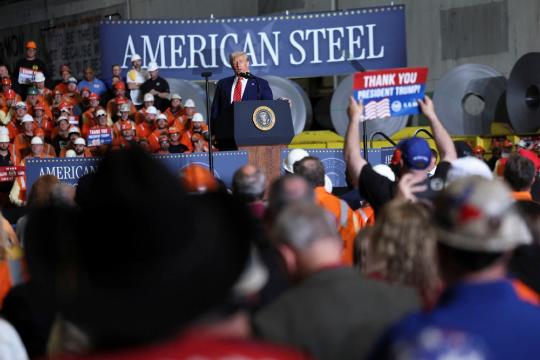Latest hike of steel, aluminum tariffs slammed as 'lose-lose' for businesses in both U.S. and India
Businesses in both India and the United States will be negatively impacted after the U.S. administration doubled tariffs on steel and aluminum to 50 percent on May 30, analysts said.
The U.S. policies are mutually harming and, thus, "manufacturers and entrepreneurs in India are apprehensive" of U.S. moves, said Karori Singh, former director and an emeritus fellow of the South Asia Study Centre at the University of Rajasthan in India.
Considering the uncertainty and assertiveness in U.S. trade policies, India is adopting a two-pronged strategy to expedite free trade agreements with various countries and regions, such as the United Kingdom and European Union, according to Singh.
The Global Trade Research Initiative (GTRI), a New Delhi-based think tank, stated that the consequences of increased U.S. tariffs on steel and aluminum will have a direct impact on the Indian economy.
According to the GTRI, India exported $4.56 billion worth of iron, steel, and aluminum products to the U.S. in 2024-25, while India imports nearly $2 billion worth of products including iron, steel, and aluminum from the U.S..
The GTRI warned that the higher tariffs announced by U.S. President Donald Trump will negatively affect Indian manufacturers and exporters, potentially affecting their competitiveness and profitability in the U.S. market.
"We have barely settled down after the March announcement of sectoral tariff. How can we do business with such uncertainty in tariffs?" Pankaj Chadha, chairman of EEPC India, told The Hindu newspaper. EEPC India, or the Engineering Exports Promotion Council, is the trade and investment promotion body for the engineering sector sponsored by India's Ministry of Commerce &Industry.
Indian exporters now "need to diversify to other markets", Chadha added.
"It remains to be seen whether India will carry out the retaliation by increasing tariffs on certain U.S. exports within a month," GTRI founder Ajay Srivastava was quoted as saying by local media.
Singh said trade negotiations between India and the U.S. were at an advanced stage, noting that India's Commerce Minister Piyush Goyal traveled to Washington, DC, for talks in May.
"Though the trade deal between India and the U.S. is on a win-win mode, Trump's recent increase of tariffs on steel and aluminum to 50 percent is again impinging upon Indian exports to the U.S.," Singh added.
On May 12, India notified the World Trade Organization of potential retaliatory measures in response to U.S. tariffs on steel and aluminum.
India vowed to impose "an equivalent amount of duty collected from products originating in the United States" as part of its proposed suspension of concessions.
The need for expanding trade and intensifying techno-economic partnership was emphasized as part of the joint statement when Indian Prime Minister Narendra Modi visited the U.S. in February.
Lawrence Loh, director of the Centre for Governance and Sustainability at the National University of Singapore's Business School, said the U.S. decision to double tariffs was "lose-lose".
He also said the move is clearly protectionist and violates the norms of free international trade.
"India, in particular, will take the full brunt of the new move as the U.S. is a leading importer of steel and aluminum from the country," he said.
Loh also said that for U.S. businesses, the tariffs will drive up costs as many rely on steel and aluminum in their products. As a result, many may lose their global competitiveness, he said.
"U.S. consumers, too, will face higher prices as steel and aluminum are present in many household items," said Loh. "The U.S. tariffs continue to be lose-lose for all countries and reflect badly on the credibility of the U.S. governance leadership."
Singh, from the University of Rajasthan, similarly pointed out Trump's decision will not only affect major steel, iron, and aluminum exporting countries such as India but also manufacturers in the U.S., whose global competitiveness will be reduced.
He warned that the tariffs could see imported steel costing U.S. companies up to triple the price of steel in the domestic market of other countries.

